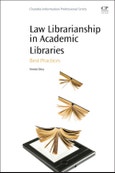In the last two decades, advancement in technology has transformed every aspect of librarianship. Law Librarianship in Academic Law Libraries discusses issues and model practices in academic law libraries. This text will help librarians and library school students understand the operation, resources and facilities that are available in the academic law library. It explains the practices and trends that are widely practiced in different parts of the world. This book describes the expectations of an aspiring professional with an interest in specializing in law librarianship; revealing facts pertaining to management and administration which are not necessarily taught in library schools. The first chapter introduces the history of academic law libraries, and defines law librarianship. The remaining chapters are dedicated to different aspects of law librarianship including the importance of emerging technologies and how they are implemented in the academic law libraries setting, finishing with a concluding chapter on global opportunities available for law librarians.
Please Note: This is an On Demand product, delivery may take up to 11 working days after payment has been received.
Table of Contents
Chapter One: discusses and defines law librarianship; it identifies the different types of law libraries, their users and collection. This chapter includes a brief history of academic law libraries in some jurisdictions as well as the structure and applicable standards of accreditation. Each library has its own users, Chapter Two: discusses the users of the academic law library and the levels of services provided to them; Chapter Three: gives an in depth discourse on the collection development and management practices in the academic law library. The nature of legal materials makes them very unique and expensive to maintain, the author discusses the best practices in building and maintaining this type of collection especially in an electronic and digital age; Chapter Four: describes the activities of the front end of the academic law library, mainly circulation and reference services. These two areas are the action points in the library where services and operations take place.Academic law libraries use different classification schemes to organize the materials in their collection; Chapter Five: identifies a few of the available classification schemes and explains how they have been used in some libraries; Chapter Six: highlights these trends and developments and how they have impacted the delivery of services and resources in academic law libraries; Chapter Seven: discusses the issues and suggested steps for law librarians who would like to advance to management positions in their career, discusses the importance of professional development and networking in building a career; Chapter Eight: explains and discusses available opportunities for law librarians all over the world.








